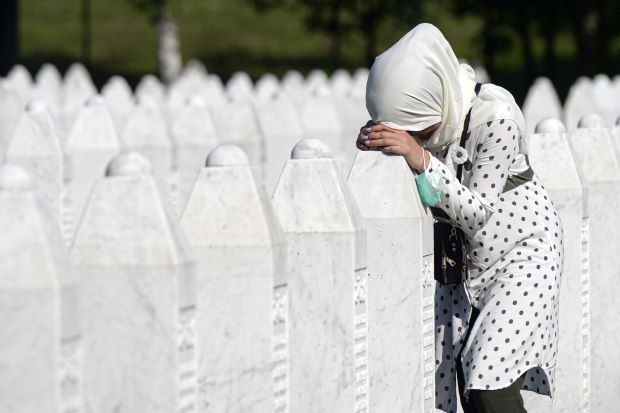Bosnian Muslims commemorate Srebrenica genocide

By Rusmir Smajilhodzic
SREBRENICA – Thousands of people were expected to gather Thursday (11) in Srebrenica to commemorate the 1995 massacre of Bosnian Muslims during the country’s civil war, two months after the UN created an annual day of remembrance of the genocide.
On July 11, 1995, Bosnian Serb forces captured the eastern Bosnian town – which was then a UN-protected enclave – and killed 8,000 Muslim men and boys in the following days.
The worst massacre in Europe since World War II has been ruled a genocide by two international courts.
In May, the United Nations General Assembly adopted a resolution declaring July 11 the ‘International Day of Reflection and Commemoration of the 1995 Genocide in Srebrenica’.
The resolution was fiercely opposed by Serbia and Bosnian Serbs, who continue to play down the crime.
Milorad Dodik, President of Bosnia’s Serbian entity, has repeatedly denied a genocide occurred and says his administration would not recognise the resolution.
A UN court sentenced Bosnian Serb wartime political leader Radovan Karadzic and his army chief Ratko Mladic to life in prison for war crimes including the Srebrenica genocide.
On Thursday, the remains of 14 more victims of the bloodshed, including a 17-year-old boy, will be buried at a memorial cemetery in Potocari, just outside Srebrenica.
Beriz Mujic, whose remains were found in the Srebrenica region last year, will be laid to rest next to his brother Hazim.
So far, the remains, often incomplete, of 6,988 Srebrenica victims have been buried, the overwhelming majority of them under white tombstones in Potocari.
The remains were found in 87 mass graves, and a spokeswoman for Bosnia’s Institute for Missing Persons told AFP that they are still looking for around 1,000 people.
To cover up the crime, Bosnian Serb forces moved the bodies of the victims to so-called secondary mass graves.
On Wednesday (10), the European Union, which Bosnia aspires to join, called the atrocity “one of the darkest moments in modern European history”.
“There is no place amongst us for those who deny genocide, attempt to rewrite history, and glorify war criminals,” EU foreign policy chief Josep Borrell and EU enlargement commissioner Oliver Varhelyi said in a joint statement.
The annual commemoration ceremonies started on Monday (8) with a 100-kilometre (62-mile) march towards Srebrenica.
Several thousand people joined the march from the village of Nezuk, where the first survivors arrived days after the massacre.
Bosnia’s 1992-1995 war between its Croats, Muslims and Serbs claimed approximately 100,000 lives.
Nearly three decades after the war ended, the Balkan nation remains deeply divided along ethnic lines.
-Agence France-Presse
A woman leans on a gravestone in Potocari, near Srebrenica, Bosnia, on July 11, 2020. More than 8,000 Bosnian Muslims perished in 10 days of slaughter after Srebrenica was overrun by Bosnian Serb forces during the closing months of the country’s 1992-95 fratricidal war, in Europe’s worst post-World War II massacre -AP


Comments are closed, but trackbacks and pingbacks are open.